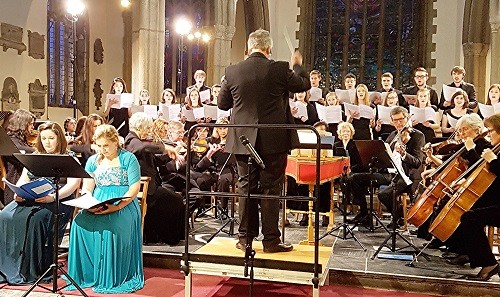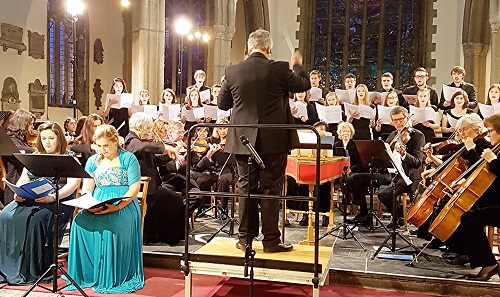 United Kingdom Purcell, Walton, Arne, Linley the younger: Augusta Hebbert and Anita Watson (sopranos); Alexander Robin Baker (baritone), Ten Tors Orchestra with Bath Spa University Chamber Choir / Simon Ible (conductor), Minster Church of St Andrew, Plymouth UK 23.4.2016 (PRB)
United Kingdom Purcell, Walton, Arne, Linley the younger: Augusta Hebbert and Anita Watson (sopranos); Alexander Robin Baker (baritone), Ten Tors Orchestra with Bath Spa University Chamber Choir / Simon Ible (conductor), Minster Church of St Andrew, Plymouth UK 23.4.2016 (PRB)

Purcell: Suite of Incidental Music: ‘Abdelazer’
Walton: Two pieces for strings from ‘Henry V’
Arne: Six Shakespeare Songs
Linley the younger: Lyric Ode on the Fairies, Aerial Beings and Witches of Shakespeare
Around the UK just now, numerous events are taking place to celebrate the 400th anniversary of the death of William Shakespeare. Plymouth hasn’t forgotten the Bard either, who was born and died in Stratford-upon-Avon, some 200 miles away in the Midlands.
Peninsula Arts is the public arts programme of Plymouth University, and is already well-known and highly-respected for enriching lives locally through high-quality cultural experiences and performances. Apart from the internationally-acclaimed annual Contemporary Music Festival (see Reviews from 2013, 2014, 2015 and 2016 respectively), where it combines with the University’s own Interdisciplinary Centre for Computer Research, it also works in partnership with outside affiliated agencies, and has already promoted a number of annual Words and Music Festivals in conjunction with the city’s longest-established Language School. The Bard simply provided the extra impetus for this year’s festival, ‘Celebrating Shakespeare’, which presents music, films, research and performances set in the context of eighteenth-century English Theatre, twentieth-century world cinema, jazz and twenty-first century comedy and songs. Introducing the programme, nonagenarian Suzanne Sparrow – Founder of the annual festival, and Principal of the Suzanne Sparrow Plymouth Language School – explained: ‘This festival epitomises the magical and mystical sounds of the English language in speech and music which are drawn from way back in our history right up to the present day.’
Such, then, is the background to the festival’s Gala Concert which took place on the very day, 400 years after Shakespeare’s death.
Ten Tors Orchestra Strings opened with an idiomatic account of Purcell’s Suite from the Incidental Music to Abdelazer which, if not totally riveting in all of its nine movements, did include the Rondeau, immortalised by Britten in his Young Person’s Guide to the Orchestra, and which received an especially spirited rendition.
Walton’s Two Pieces from Henry V drew some finely-shaped and delicate playing from the strings, and nowhere more so than in the muted second piece – Touch her soft lips and part – which really tugged at the heartstrings.
Arne’s Six Shakespeare Songs introduced two of the evening’s soloists – soprano Augusta Hebbert – in a neatly-articulated reading of Under the Greenwood Tree, followed by Blow, blow thou winter wind, equally well-despatched by Australian soprano Anita Watson. There was some attractive flute-playing from Judith Hall to enhance Hebbert’s The Cuckoo Song, and Watson’s The Owl, who then delivered the familiar Come away, death with poignant emotion. Some equally-alluring piccolo-work from Ruth Ballantyne heightened arguably the set’s best-loved number, Ariel’s Song, Where the bee sucks, there suck I, from ‘The Tempest’, mimicking the lightness of Hebbert’s animated delivery.
The whole of the second half was given over to a complete performance of the Shakespeare Ode (or, to give it its full title, Lyric Ode on the Fairies, Aerial Beings and Witches of Shakespeare) by Thomas Linley the younger – affectionately known as the ‘English Mozart’. Linley wrote the work in 1776, and it was well received. According to the comprehensive programme notes, a writer in ‘A Dictionary of Musicians’ in 1824 subsequently commented: ‘Neither Purcell nor Mozart ever gave stronger proofs of original genius than could be traced in this charming ode’. Unfortunately Linley’s potential was never realised, as he was tragically drowned in a boating accident at the age of twenty-two, just over two years after the Ode was composed.
Linley was born at the Abbey Green, Bath, in 1756, so it was apt that Peninsula Arts Director of Music, and conductor of Ten Tors Orchestra, Simon Ible, should have enlisted the aid of Bath Spa University Chamber Choir to sing Linley’s quite challenging work. But there was also a further connection in that Ible had spent almost twenty years previously working in the Bath area, as Artistic Director and Resident Conductor of Bath City Orchestra, directing the annual season or orchestral concerts in the Georgian city’s famous venues such as the Pump Room, Guildhall, and Assembly Rooms.
The young Bath singers had clearly been well rehearsed for their role, by chorus-master and Reader in Music at the University, Matthew Spring, which showed particularly well in the number of contrapuntal choruses, where the sopranos were very secure, and dominated the four-part texture. The Ode proper cast Hebbert as Spirit of Avon, Watson as Fancy, and baritone-soloist Alexander Robin Baker, bringing his rich tone to the proceedings, as Fearful Observer.
The work is in two fairly-equal parts, with an overture, chorus, recitatives and airs along the way. While the listener wouldn’t have realised this, the orchestral parts used an incredibly small stave-size, so that, for example, looking at the oboes’ shared line, it was very difficult to follow each individual player’s line, especially with more than a fair share of crossing over involved, and all this at stand-reading distance under the usual performance lights. Add to this the necessary cost-imposed restrictions in rehearsal time, and it was a real credit to players and conductor, that glitches were kept to the minimum and largely unobtrusive, and where the confident and assured leadership by Mary Eade played a vital part in keeping the ensemble nicely on course from start to finish.
The female soloists didn’t get away lightly either, as some of rapid coloratura passages were not always instinctive in note-progression, and often written without much mercy or concern for breathing. In terms of their respective contributions Hebbert fared on average less well than Watson, who seemed more comfortable with the style, despite neither probably ever having sung the work before. On the plus side Hebbert’s Come then, O Fancy, bend thy bow and Watson’s Some drive the clam’rous owl away came off well, as did the penultimate duet For who can wield like Shakespeare’s skilful hand?. Andrew Knight’s superbly-played oboe obbligato in Spirit of Avon’s Ariel, who sees thee now? was a pure delight to hear. With considerably less to do, Robin Baker proved more than adequate for the demands of his particular character. And even if the rarely-heard work really needed some serious pruning, it was still delivered with gusto and panache, and very much communicated the composer’s intentions and writing-style of the time.
But the final accolade must go to conductor, Ible, for his clear and uncompromised direction on the night, and for devising this interesting and varied programme that celebrated the Bard’s influence so effectively – in fact, both as you might like it, and all at one fell swoop.
Philip R Buttall
